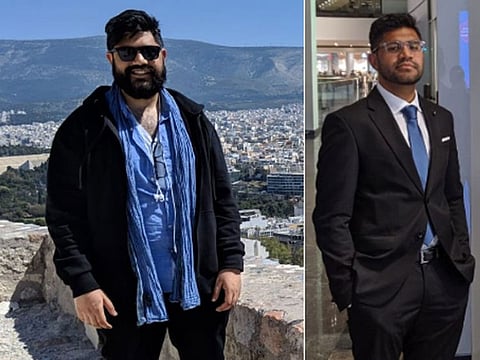UAE weight-loss story: 'How I lost 26kg in 4 months'
Bad knees did not prove an obstacle for Khawar Naveed Bhatti's health goals

It’s a theory of relativity. If you are used to being fit and fast on your feet and an injury lays you out, you feel the change more accurately than if you had been a couch potato all along.
In 2010, Khawar Naveed Bhatti suffered an ACL (anterior cruciate ligament) – which helps stabalise knee joints – tear, which meant he had to let go of his usual football time. Unfortunatley for him, his hunger pangs had not been affected by his sudden decrease in activity, resulting in a steady gain of weight.
When two years later, Bhatti’s affected knee felt well enough for him to indulge in some more game time, he faced a new problem. “Because I was putting weight on one knee for more than a year, the other knee got affected by it,” he explains in an interview with Gulf News. His other knee suffered an ACL tear as well.
“I wanted to lose weight and put less pressure on my knees as well. But to lose weight I would be expected to do cardio stuff and to use my knee, so that was a main blocking point for me for a very long [time],” he says.
By May of 2019, Bhatti, whose height is 5 feet-10 inches, weighed 103kg. “Clearly, I needed a change,” he says.
Ray of hope
It began with a pact with his Dubai friends. “I had a talk with a few of my friends here, who have [over time also] put on weight. We made a pact with each other that we’ll try to do something about it in 4 months,” he says. At the time, he was in the UK for an MBA, his classes were completed and he was working on his dissertation. It was also time for the fasting month of Ramadan. “I was having only one meal per day…it worked for me,” he says. “I ended up losing about 8kg.”
Intermittent fasting
Motivated to see what would happen next, he started going to a gym and researching intermittent fasting. “I was looking at a lot of YouTube videos on intermittent fasting, which is basically the diet I follow. It is 1,000 calories for lunch and 500-700 calories for dinner and within that time [frame],” he says.
Bhatti found that all the successful weight-loss testimonials he would come across had one thing in common: the subjects were all consistent. “If you are going to do a diet have it be something you can carry on, so you should not be giving up the foods you like,” he explains.
What about the knees?
Didn’t the knee issues crop up though? “I found that when you are on the heavier side as I was, cardio is not actually very effective. Weight training is what matters. Cardio would just burn fat but weight training turns the fat into muscle, that's better and that way there is less stress on the knees,” he says.
Five months on, Bhatti, who has returned to Dubai, is down to 76.5kg. That’s a loss of 26.5kg.
All this was only possible, says Bhatti, because he had a lot of time on his hands.
So what happens when he’s employed, tied down to a 9 to 5? “This is a lifestyle change, my plan was that one I get to between 70-75kg I can maintain it by watching my weight regularly. It will be tough for sure, but anytime I think I'm slipping to above 75, all I need to do is look at my old pictures and remind myself of the effort it took,” he laughs.
It is after all a relative thing; once you are lithe, giving it up is difficult.
Sign up for the Daily Briefing
Get the latest news and updates straight to your inbox








